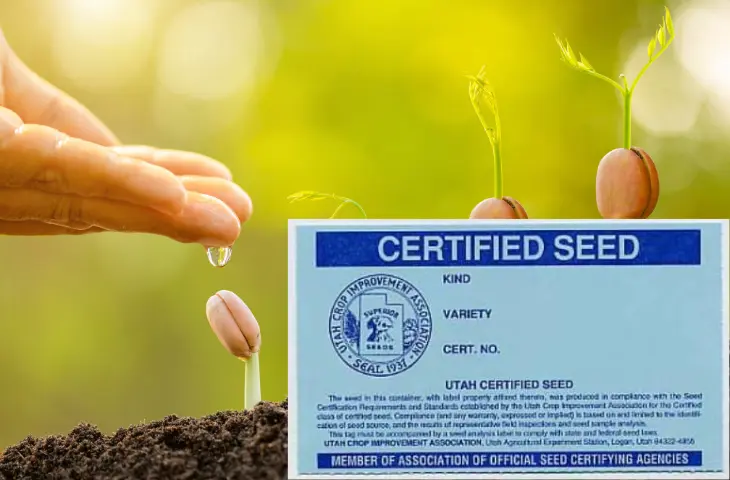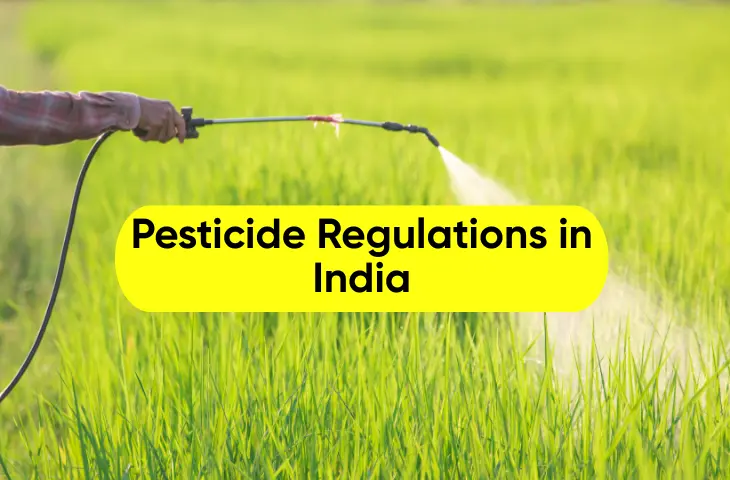Seed Certification: Seed certification in India is a critical part of agriculture that ensures farmers get high-quality seeds. Certified seeds are tested for purity, germination, and disease resistance. By promoting quality seeds, India aims to increase crop productivity, protect farmers’ income, and maintain sustainable farming practices. This blog covers the seed certification framework, key laws, quality control measures, benefits, and challenges in India.
What is Seed Certification?
Seed certification is a process where seeds are inspected, tested, and approved by authorized agencies to meet national quality standards. It ensures:
- High germination rate
- True-to-type seeds (genetically pure)
- Free from diseases and pests
Important Laws and Regulations Governing Seeds in India
India has established a legal framework to regulate seed quality and certification. Key laws include:
| Law/Act | Purpose |
| Seed Act, 1966 | Ensures sale of quality seeds, prohibits sale of low-quality or adulterated seeds |
| Seed Rules, 1968 | Provides guidelines for seed testing, labeling, and certification |
| Seeds Control Order, 1983 | Regulates import, export, and sale of seeds in India |
| National Seeds Policy, 2002 | Promotes certified seeds, public-private partnership, and quality seed production |
| Protection of Plant Varieties & Farmers’ Rights Act, 2001 | Protects intellectual property rights of breeders and farmers |
Learn About Pesticide Regulation in India
Seed Certification Framework in India
The seed certification system in India is managed by the Central Seed Certification Board (CSCB) and State Seed Certification Agencies (SSCA). The process includes:
| Stage | Description |
| Field Inspection | Certified seeds are grown under monitored conditions; fields are inspected for purity, isolation, and plant health |
| Seed Sampling | Seeds are collected and tested for germination, moisture content, and seed-borne diseases |
| Laboratory Testing | Accredited labs analyze seed samples to ensure compliance with national standards |
| Tagging & Labeling | Approved seeds receive tags indicating certification and quality |
| Distribution & Monitoring | Certified seeds are distributed to farmers and tracked for quality assurance |
Quality Control Measures in Seed Production
Effective quality control measures in seed production are essential in India to ensure certified seeds meet national standards for germination, purity, and disease resistance, helping farmers achieve better crop yields
- Genetic Purity: Ensures the seed variety is true-to-type
- Physical Purity: Removes weeds, inert matter, and other varieties
- Germination Rate: Only seeds with high germination are certified
- Seed Health Testing: Prevents seed-borne diseases from spreading
- Traceability: Records maintained for production, certification, and distribution
Benefits of Seed Certification
Seed certification in India offers multiple benefits, including improved crop productivity, disease resistance, farmers’ income security, and compliance with national and international agricultural standards:
- Improved Crop Yield: High-quality seeds lead to better productivity
- Disease Resistance: Reduces crop losses due to pests and diseases
- Farmers’ Income Security: Stable yields provide economic benefits
- Compliance with Export Standards: Helps farmers access international markets
- Sustainable Agriculture: Promotes adoption of quality seeds and efficient farming practices
Challenges in Seed Certification and Quality Control
Despite a robust framework, seed certification and quality control in India face challenges such as limited awareness among farmers, enforcement gaps, high costs, and the presence of substandard seeds in the market:
| Challenge | Explanation |
| Low Awareness Among Farmers | Many farmers still use uncertified seeds due to lack of knowledge |
| Limited Reach in Remote Areas | Quality seeds are not always available in rural regions |
| Enforcement Issues | Weak monitoring allows sale of substandard seeds |
| High Costs for Small Farmers | Certified seeds can be expensive for marginal farmers |
| Seed Adulteration | Mixing of low-quality seeds reduces effectiveness of certification |
FAQs
Seed certification is the process of inspecting, testing, and approving seeds to ensure they meet national quality standards for germination, purity, and disease resistance.
Certified seeds help farmers get better crop yields, resist pests and diseases, and ensure stable income by providing high-quality, true-to-type seeds.
The Central Seed Certification Board (CSCB) and State Seed Certification Agencies (SSCA) oversee the seed certification process in India.
Important laws include the Seed Act, 1966, Seed Rules, 1968, Seeds Control Order, 1983, National Seeds Policy, 2002, and Protection of Plant Varieties & Farmers’ Rights Act, 2001.
Measures include checking genetic purity, physical purity, germination rate, seed health testing, and traceability of seed production and distribution.
- IBPS AFO Mains Scorecard 2025 Out for Interview-Qualified Candidates

- NABARD SO Notification 2025-26 Out, Download PDF

- Impact of APMC Act on Agricultural Markets in India & Reforms

- Seed Certification in India, Framework and Quality Control

- Pesticide Regulations in India, Key Laws and Compliance

- Impact of MSP Act on Agricultural Markets in India & Reforms


Priti Palit, is an accomplished edtech writer with 4+ years of experience in Regulatory Exams and other multiple government exams. With a passion for education and a keen eye for detail, she has contributed significantly to the field of online learning. Priti’s expertise and dedication continue to empower aspiring individuals in their pursuit of success in government examinations.